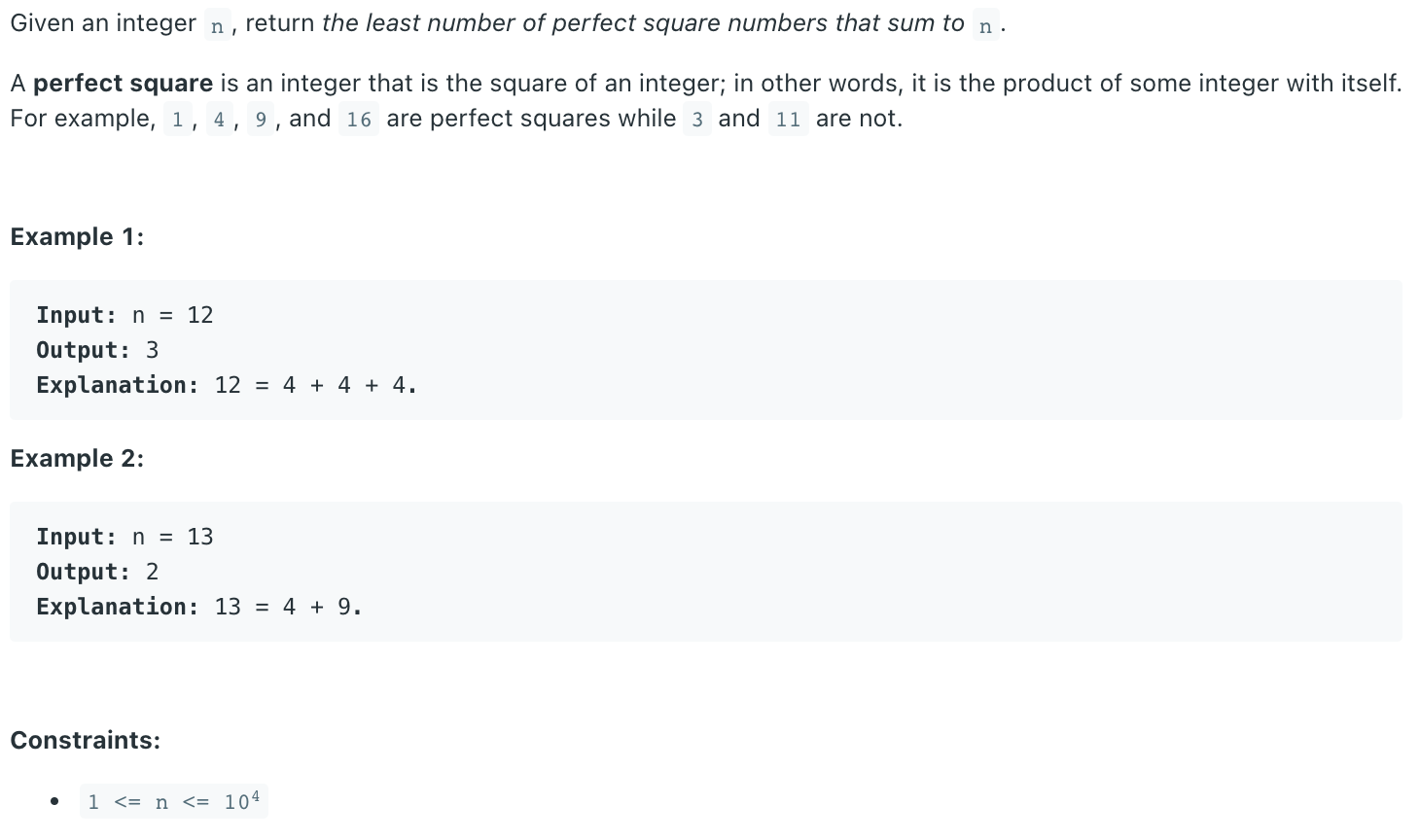Perfect Squares
franklinqin0 MathDPDFS

# Import
from math import sqrt
1
# Solution
TLE
# Brute Force
Exponential runtime. TLE on 55.
def numSquares(self, n: int) -> int:
square_nums = [i**2 for i in range(1, int(sqrt(n))+1)]
def minNumSquares(k: int) -> int:
if k in square_nums:
return 1
min_num = sys.maxsize
# find the minimal value among all possible solutions
for square in square_nums:
if k < square:
break
min_num = min(min_num, minNumSquares(k-square) + 1)
return min_num
return minNumSquares(n)
1
2
3
4
5
6
7
8
9
10
11
12
13
14
15
2
3
4
5
6
7
8
9
10
11
12
13
14
15
# Memoized DP - Top Down
def numSquares(self, n: int) -> int:
square_nums = [i**2 for i in range(1, int(sqrt(n))+1)]
memo = [sys.maxsize for _ in range(n+1)]
memo[0] = 0
def minNumSquares(k: int) -> int:
if k in square_nums:
memo[k] = 1
if memo[k] < sys.maxsize:
return memo[k]
# find the minimal value among all possible solutions
for square in square_nums:
if k < square:
break
memo[k] = min(memo[k], minNumSquares(k-square) + 1)
return memo[k]
return minNumSquares(n)
1
2
3
4
5
6
7
8
9
10
11
12
13
14
15
16
17
18
2
3
4
5
6
7
8
9
10
11
12
13
14
15
16
17
18
# Memoized DP - Bottom Up
Complexity
time:
space:
def numSquares(self, n: int) -> int:
square_nums = [i**2 for i in range(1, int(sqrt(n))+1)]
dp = [sys.maxsize for _ in range(n+1)]
dp[0] = 0
for i in range(1, n+1):
for square in square_nums:
if i < square:
break
dp[i] = min(dp[i], dp[i-square] + 1)
return dp[-1]
1
2
3
4
5
6
7
8
9
10
11
12
2
3
4
5
6
7
8
9
10
11
12
# Greedy Enumeration
Complexity
time:
space:
def numSquares(self, n: int) -> int:
square_nums = set(i**2 for i in range(1, int(sqrt(n))+1))
def is_divided_by(n, cnt):
"""
return: true if "n" can be decomposed into "count" number of perfect square numbers.
e.g. n=12, count=3: true.
n=12, count=2: false
"""
if cnt == 1:
return n in square_nums
for square_num in square_nums:
remainder = n - square_num
if is_divided_by(remainder, cnt-1):
return True
return False
for cnt in range(1, n+1):
if is_divided_by(n, cnt):
return cnt
1
2
3
4
5
6
7
8
9
10
11
12
13
14
15
16
17
18
19
20
21
2
3
4
5
6
7
8
9
10
11
12
13
14
15
16
17
18
19
20
21
# BFS
Use set instead of list for queue to eliminate the redundancy.
Complexity
time:
space:
def numSquares(self, n: int) -> int:
square_nums = [i**2 for i in range(1, int(sqrt(n))+1)]
level = 0
queue = {n}
while queue:
level += 1
next_queue = set()
for remainder in queue:
for square_num in square_nums:
if remainder == square_num:
return level # node found
elif remainder < square_num:
break
else:
next_queue.add(remainder - square_num)
queue = next_queue
return level
1
2
3
4
5
6
7
8
9
10
11
12
13
14
15
16
17
18
19
2
3
4
5
6
7
8
9
10
11
12
13
14
15
16
17
18
19
# Math
In 1770, Lagrange's four-square theorem(or Bachet's conjecture) states that every natural number can be represented as the sum of four integer squares.
In 1797, Gauss–Legendre three-square theorem states that is a sum of three squares precisely when is not of the form for any nonnegative integers , :
So here is our strategy:
- Check if
nis of the form . If yes, return - Otherwise, check if
nis a perfect square, or a sum of perfect squares - Else,
nis a sum of perfect squares
def isSquare(self, n: int) -> bool:
sq = int(sqrt(n))
return sq*sq == n
def numSquares(self, n: int) -> int:
# four-square and three-square theorems
while (n & 3) == 0:
n >>= 2 # reducing the 4^k factor from number
if (n & 7) == 7: # mod 8
return 4
if self.isSquare(n):
return 1
# check if the number can be decomposed into sum of two squares
for i in range(1, int(n**(0.5)) + 1):
if self.isSquare(n - i*i):
return 2
# bottom case from the three-square theorem
return 3
1
2
3
4
5
6
7
8
9
10
11
12
13
14
15
16
17
18
19
2
3
4
5
6
7
8
9
10
11
12
13
14
15
16
17
18
19